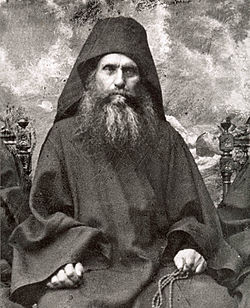Silouan the Athonite
Saint Silouan the Athonite | |
|---|---|
 | |
| Venerable and God-bearing Father | |
| Born | 1866 Shovsk village, Tambov Governorate, Russian Empire |
| Died | September 24, 1938 Mount Athos, Greece |
| Venerated in | Eastern Orthodox Church |
| Canonized | 1987 by Ecumenical Patriarchate of Constantinople |
| Feast | September 24 |
Silouan the Athonite (Russian: Силуан Афонский) also sometimes referred to as Silouan of Athos, Saint Silvanus the Athonite or Staretz Silouan (1866–1938) was an Eastern Orthodox monk of Russian origin, born Simeon Ivanovich Antonov who was a poet and monk of the St. Panteleimon Monastery.[1]
Life

He was born Simeon Ivanovich Antonov, of Russian Orthodox parents who came from the village of Sovsk in Imperial Russia's Tambov Governorate. At the age of twenty-seven, after a period of military service, he left his native Russia and came to the monastic state of Mt. Athos (an autonomous peninsula in Greece) where he became a monk at the Monastery of St Panteleimon, known as "Rossikon", an Orthodox monastery that houses Russian monks yet is, as all the Athonite monasteries, under the jurisdiction of the Patriarch of Constantinople, and was given the name Silouan (the Russian version of the Biblical name Silvanus.)
An ardent ascetic, he received the grace of unceasing prayer and saw Christ in a vision. After long years of spiritual trial, he acquired great humility and inner stillness. He prayed and wept for the whole world as for himself, and he put the highest value on love for enemies. He became widely known as an elder. The writer and mystic Thomas Merton has described Silouan as “the most authentic monk of the twentieth century.”[citation needed] St Silouan died on September 24, 1938. His memory is celebrated on September 24.
Though barely literate, he was sought out by pilgrims for his wise counsel. His writings were edited by his disciple and pupil, Archimandrite Sophrony. Father Sophrony has written the life of the saint along with a record of St. Silouan's teachings in the book Saint Silouan the Athonite.
Starets Silouan was canonized by the Ecumenical Patriarchate in 1987.
Quotations
- Those who dislike and reject their fellow-man are impoverished in their being. They do not know the true God, who is all-embracing love.
- Keep your mind in hell and do not despair, said to be a teaching God gave him through a voice from above.
- The soul that is in all things devoted to the will of God rests quiet in Him, for she knows of experience and from the Holy Scriptures that the Lord loves us much and watches over our souls, quickening all things by His grace in peace and love. Nothing troubles the man who is given over to the will of God, be it illness, poverty or persecution. He knows that the Lord in His mercy is solicitous for us. The Holy Spirit, whom the soul knows, is witness therefore. But the proud and the self-willed do not want to surrender to God's will because they like their own way, and that is harmful for the soul. (From the Life and Teachings of Elder Siluan by Bishop Alexander and Natalia Bufius translated by Anatoly Shmelev)
- The condition of peace among men is that each should keep a consciousness of his own wrongdoing
References
- ^ John Anthony McGuckin The Encyclopedia of Eastern Orthodox Christianity 2011 St. Silouan of Athos (1866-1938) JULIA KONSTANTINOVSKY St. Silouan of Athos, also known as Silvanus, was born Simeon Ivanovich Antonov of Russian peasant origin, and became a schema-monk of the St. Panteleimon monastery
- Saint Silouan the Athonite by Archimandrite Sophrony Publisher: St. Vladimir's Seminary Press ISBN 0-88141-195-7
- The Life and Teachings of Elder Siluan-Bishop Alexander and Natalia Bufius-Translated by Anatoly Shmelev. Missionary Leaflet # EA17 Holy Trinity Orthodox Mission, 466 Foothill Blvd, Box 397, La Canada, Ca 91011
External links
- Photographs of Saint Silouan the Athonite
- Silouan the Athonite
- On the Will of God by Staretz Silouan of Mt. Athos
- The Theology of St. Silouan, Archim. Zacharias Zacharou (video lecture)
